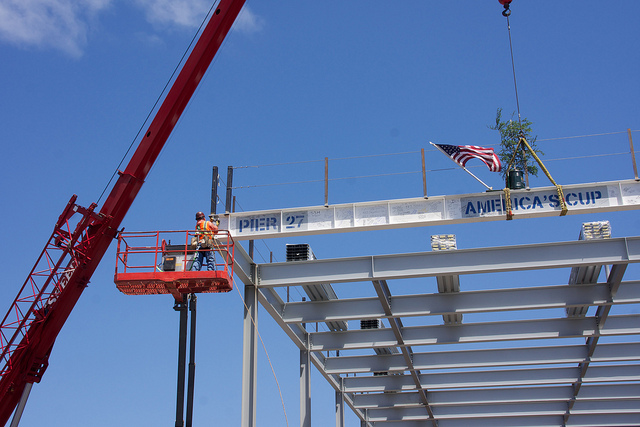The America’s Cup may not turn out to be the benefit to San Francisco that city leaders and private boosters once promised. But the city’s economic development officials still say taxpayers can break even by hosting a scaled-back version of the boat race this summer.
Buried deep in Mayor Ed Lee’s proposed city budget released on May 31 was $22 million directed toward planning, permitting, emergency, security and transit measures for the America’s Cup.
Last October, when the Board of Supervisors approved up to $32 million in city spending for the event, the supervisors boasted about the hundreds of millions of dollars in business it would bring for the tourist industry and the thousands of new jobs it would create. And they stressed that this would all be essentially free for taxpayers.
Even with a tragic boating accident and economic troubles for the organizers threatening to reduce the economic rewards of the event, the city still intends to get the $22 million through private donations fund-raised by the America’s Cup Organizing Committee.
However, less than $16 million has been raised so far for the city’s Office of Economic and Workforce Development, which is coordinating disbursal of funds for the competition, whose premier events run from July to September with venues up and down the Embarcadero.
“Last Thursday, we received a $750,000 check, so the money is still coming in,” said Jane Sullivan, the office’s spokeswoman for the America’s Cup project. She did not identify the donor.
If the balance of the fund-raising does not come through, the city’s taxpayers would have to make up the difference.
“We are projecting $13 million in tax revenues resulting from these events, so if the fundraising were to fall short, these revenues would make the general fund whole,” Sullivan said. “We expect a significant fundraising increase by the time the race starts.”
The original $32 million price tag for city services was based on a much grander vision that Larry Ellison, founder of Oracle and the sponsor of the world-class sailing event, was hoping for. His original event would have generated $1.4 billion in economic activity altogether, but it has been trimmed to $900 million.
Back in the fall, Ellison was promising 15 competitors for the main race. Now the contenders have dropped down to four sailing teams. If anything else goes wrong, the whole event could fall apart, critics warn.
Despite the setbacks, workforce development officials say the investment is worth it. Original projections were for 8,800 new jobs. Now they expect to create 6,500 jobs. Even if the city had to pay for all of the remaining expenses itself, without additional fund-raising, that would come out to $1,076 per job — a pretty good return on investment.
Those gains, Sullivan said, will ripple through the local economy. “It will ultimately be beneficial for the Bay Area,” Sullivan said.
But critical voices are becoming louder. District 11 Supervisor John Avalos said the event is too exclusive, and the benefits will mostly accrue to the event’s superrich organizers.
“What was supposed to be a big regatta turned out to be three men in a tub,” Avalos said. “Ellison has created a monopoly that is difficult for other teams to take part in.”
One local organization, the Brightline Defense Project, said the event’s private management team has violated local hiring and prevailing wage laws.
“The America’s Cup is the blueprint of how we, as a city, seek to attract major events and ensure local economic benefits,” said the organization’s Josh Arce. “According to what we have seen in last year’s races, the America’s Cup may not be living up to the local hiring and union jobs commitments.”
If Ellison’s own Oracle Team USA wins the race again, the city would be obliged to negotiate with him if it wants to be the host city the next America’s Cup.
This year’s races are set to begin July 4, with the final competition starting Sept. 7.










